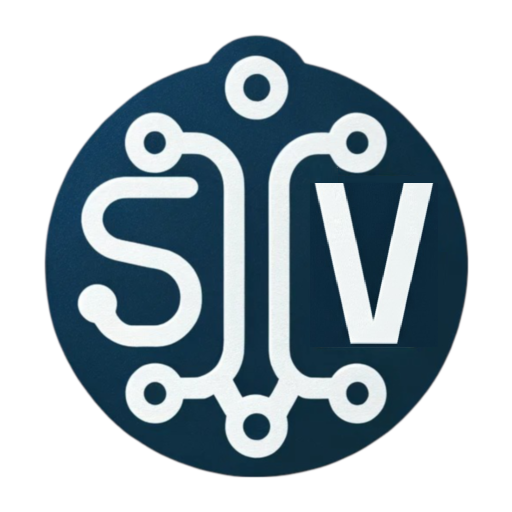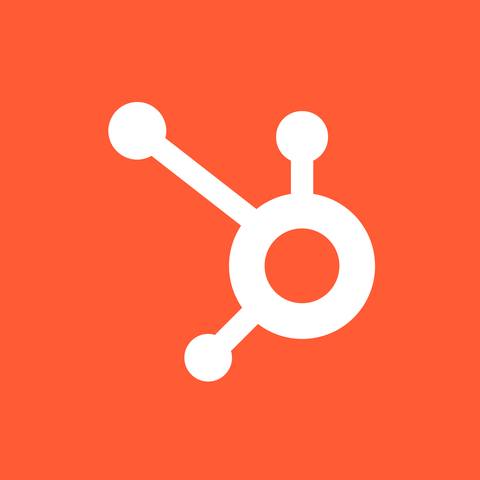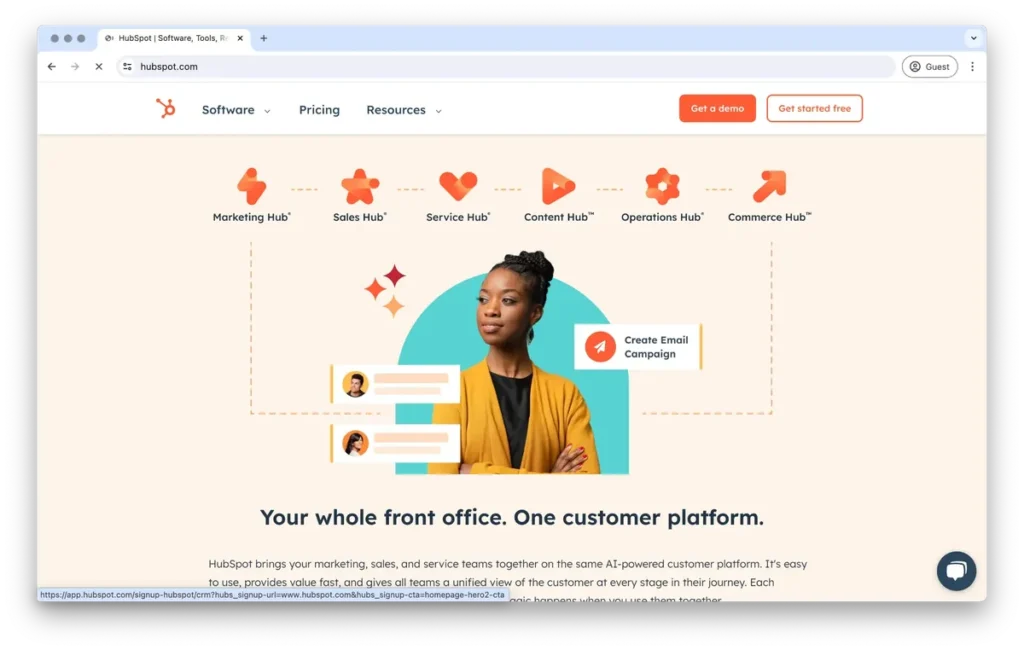Disclosure for Our Readers
This blog contains affiliate links. If you make a purchase through one of these links, our team may earn a commission at no extra cost to you. Learn more. Thanks for your support!
I remember the first time a team I was working with had to choose a CRM. The debate felt endless. On one side, we had Salesforce, the industry titan. On the other, HubSpot, the user-friendly challenger.
Here’s where it lands: HubSpot is the ideal choice for businesses prioritizing ease of use and integrated marketing. Salesforce is the unmatched solution for large enterprises needing limitless customization and power.
Choosing a Customer Relationship Management (CRM) platform is a massive decision. It becomes the central nervous system for your sales, marketing, and service teams.
This guide breaks down the HubSpot vs. Salesforce debate. We’ll compare their features, pricing, and ideal users. This will help you make the right choice for your business’s future.
A Quick Overview: Meet the Contenders
HubSpot and Salesforce are both exceptional platforms, but they were born from different philosophies. Understanding their origins helps clarify their core strengths.
Salesforce is the established market leader. It began as a pure sales tool (Sales Force Automation) and grew into a powerful, customizable platform for large enterprises.
HubSpot started with a focus on inbound marketing. It built an all-in-one platform designed for ease of use. Its goal is to help SMBs attract customers with valuable content.
Check out our full HubSpot Review.
Ease of Use and User Experience
The most significant difference between the two platforms is the user experience. This is where your team’s daily reality will be shaped.
1. HubSpot’s User-Friendly Interface
HubSpot is famous for its clean, intuitive design. Most teams can get started with minimal training. The interface is uncluttered, and workflows are logical.
This focus on simplicity drives high adoption rates. When a tool is easy to use, your team is more likely to use it consistently and correctly.
2. Salesforce’s Powerful but Complex Platform
Salesforce is incredibly powerful, but that power comes with a steep learning curve. Even with its modern “Lightning” interface, the system can feel overwhelming for new users.
Most companies need a dedicated Salesforce Administrator. This is a specialist role responsible for customization, maintenance, and user training. This is a significant resource consideration.
Check out our full Salesforce Review.
Core Features and Functionality Compared
Both platforms offer a comprehensive suite of tools for sales, marketing, and service. However, their approaches and depth differ significantly.
3. Sales Hub vs. Sales Cloud
Both platforms excel at core sales functions. This includes managing leads, contacts, accounts, and deals. The differences lie in their depth and target user.
HubSpot’s Sales Hub is built for sales rep productivity. It offers a clean pipeline view and excellent tools for email tracking and meeting scheduling.
Salesforce’s Sales Cloud offers deeper customization. It handles incredibly complex sales processes, territories, and forecasting models. It is built for granular control and reporting.
4. Marketing Hub vs. Marketing Cloud
HubSpot’s Marketing Hub is a truly all-in-one solution. It seamlessly integrates email, social media, blogging, SEO, and landing pages within one platform.
Salesforce’s Marketing Cloud is a collection of powerful, often separately purchased, enterprise-grade tools. It offers immense power but lacks HubSpot’s tight, out-of-the-box integration.
5. The Ecosystem: AppExchange vs. App Marketplace
A platform’s power is amplified by its integrations. Both Salesforce and HubSpot have robust app marketplaces that extend their native functionality.
Salesforce’s AppExchange is the largest and most mature enterprise app store. It offers thousands of deep, complex integrations for almost any business need imaginable.
HubSpot’s App Marketplace is growing rapidly. It focuses on easy-to-install applications that enhance the user experience. The integrations are typically simpler to set up and manage.
| Feature | HubSpot | Salesforce |
| User Interface | Simple and intuitive | Powerful but complex |
| Primary Focus | Inbound marketing, SMBs | Sales automation, enterprise |
| Customization | Good, but with limits | Nearly limitless |
| Administration | Managed by user/team | Requires dedicated admin |
| App Ecosystem | Large, easy installs | Massive, enterprise-focused |
Pricing and Total Cost of Ownership
Your budget is a critical factor. The sticker price rarely tells the whole story, especially when comparing these two platforms.
6. HubSpot’s Transparent, Tiered Pricing
HubSpot is famous for its free CRM and transparent pricing tiers. You can start for free and add paid “Hubs” for marketing, sales, or service as you grow.
This “freemium” model allows you to test the platform thoroughly. However, costs can escalate with higher contact tiers and advanced features in the Professional and Enterprise plans.
7. Salesforce’s Complex, a la Carte Model
Salesforce is a premium-priced product. It operates on a per-user, per-month basis, and contracts are typically billed annually.
Be aware of the hidden costs. The total investment often includes implementation partners, administrator salaries, data storage fees, and paid add-ons from the AppExchange.
Who Should Choose HubSpot?
HubSpot is the ideal choice for small-to-medium-sized businesses (SMBs). It also works well for enterprise teams that prioritize ease of use over deep customization.
Choose HubSpot if:
- Your team values a simple, intuitive user interface.
- Your strategy is built around inbound marketing and content.
- You want an all-in-one platform without needing a dedicated admin.
- You are starting out and want to grow with a free CRM.
Who Should Choose Salesforce?
Salesforce is the undisputed champion for large enterprises. It is also a fit for companies in regulated industries or those with incredibly complex business processes.
Choose Salesforce if:
- You have complex, multi-stage sales processes.
- You require deep, granular customization for objects and workflows.
- You have the budget for the software and a dedicated administrator.
- You need to integrate with a wide range of other enterprise systems.
The Final Verdict: Making Your Decision
The choice between HubSpot and Salesforce is a classic battle of simplicity versus power. There is no single “best” CRM—only the one that is best for you.
If your priority is fast adoption and an integrated marketing and sales engine, start with HubSpot. Its user-friendly approach empowers teams to succeed quickly.
If your business has unique, complex requirements and the resources to manage a powerful system, Salesforce is the more scalable, customizable choice. It is a platform you can build your entire business on.



